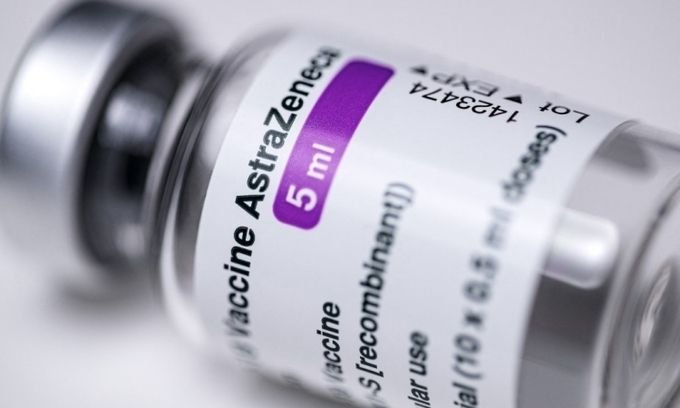
Europe may have made a mistake by postponing the AstraZeneca vaccine 1
France, Spain, Germany, Italy and more than 10 other countries have stopped administering the AstraZeneca vaccine, calling it a precautionary measure after concerns that it could be linked to post-vaccination blood clotting.
Only a handful of countries on the continent continue to use the AstraZeneca vaccine, including Britain, where more than 11 million doses have been administered and real-world data shows the vaccine is reducing infection and hospitalization rates.
A vial of AstraZeneca vaccine in Paris, France, March 11.
The actions of European governments surprised many experts and caused a lot of skepticism among those who have been vaccinated or are waiting in line to be vaccinated.
`I don’t see a reason for countries to stop vaccinating with the AstraZeneca vaccine. I really don’t understand,` Michael Head, senior researcher at the Global Health Institute at the University of Southampton, UK, told CNN.
Europe has shown an inconsistent stance on the AstraZeneca vaccine since it was approved for use in the EU in late January.
`The AstraZeneca vaccine seems to have something of a political football, for what reason I don’t know,` Head commented.
The latest controversy related to the AstraZeneca vaccine erupted last week when Denmark announced a two-week delay in administering the vaccine, citing reports of blood clots in people who received the injection, including one
To date, almost all of Western Europe has stopped vaccination with the AstraZeneca vaccine, but countries still remind people that decisions are made on a prudent basis while waiting for an assessment by the European Medicines Agency (EMA).
EMA will meet on this issue on March 18.
In Denmark, a death after vaccination immediately sparked a wave of vaccine skepticism.
The Norwegian Medicines Agency said three patients were hospitalized because of low platelet counts, blood clots in veins and bleeding.
A laboratory in the Netherlands has received 10 reports of blood clotting after vaccination.
However, the number of cases of complications above is not large enough to make medical experts worried.
Last week, the International Society on Thrombosis and Coagulation Disorders (ISTH) recommended that all eligible adults still receive the Covid-19 vaccine.
`The small number of cases of blood clotting reported among millions of Covid-19 vaccinations does not suggest a direct association,` ISTH emphasized, adding that it believes `the benefits of Covid-19 vaccination
Jon Gibbins, director of the Institute of Cardiovascular and Metabolic Research at the University of Reading, agrees that the number of reported cases of blood clots is small.
Blood clots, or thrombosis, occur for a variety of reasons, and venous thromboembolism is relatively common, affecting one to two people in every 1,000, he explains.
`When you start vaccinating millions of people, things like that are inevitable,` Gibbins said.
`From what we have seen with millions of doses of the AstraZeneca vaccine, serious side effects are really only one in a million,` commented Head, an expert from the University of Southampton.
But Gibbins notes the cases of brain clots in Germany are noteworthy.
Paul Hunter, a professor of medicine at the University of East Anglia, UK, agreed that the association needed a thorough investigation, but emphasized that the risk of death from Covid-19 is substantially higher than that of CVST.
On the other hand, according to Head, the majority of the population vaccinated with the AstraZeneca vaccine so far are people at high risk of thrombosis.
`Those who have been vaccinated, especially in Europe where the vaccination roll-out is still in its early stages, are mainly elderly and clinically vulnerable people. This is also the group of people with the highest
Importantly, Covid-19 itself also causes thrombosis.
Experts agree that the possibility of vaccines causing blood clots is rare but not impossible, but it could be due to any number of other factors.
Some past vaccines have been shown to have rare but serious side effects.
Still, the data to date still shows the rate of complications `is so low that I don’t see any reason to delay vaccine deployment,` Head emphasized.
A person is vaccinated with AstraZeneca’s Covid-19 vaccine at a vaccination center in Berlin, Germany, on March 8.
`I think vaccination against Covid-19 is much more beneficial than stopping vaccination because of the highly unlikely association with blood clots,` said Stephen Griffin, head of the antiviral and antiviral drug research group.
Countries that have postponed vaccination say the move is precautionary and will wait for guidance from the EMA, but many countries have expressed a desire to continue deployment soon.
Irish Prime Minister Micheál Martin said he wanted questions related to the AstraZeneca vaccine answered by the end of this week and that he believed Ireland could `accelerate the pace of the delayed vaccination rollout again`.
French Health Minister Olivier Véran meanwhile tried to reassure those who had been vaccinated that they were `not in any danger`.
Experts generally hope that European countries will soon resume vaccination with the AstraZeneca vaccine, but the long-term impact of this delay could be very worrying.
Medical staff holds a vial of AstraZeneca’s Covid-19 vaccine in hand.
`I’m concerned about vaccine hesitancy in Europe,` Head said, calling French President Emmanuel Macron’s previous comments about the AstraZeneca vaccine being ineffective in the elderly `useless.`
`Such fear will increase skepticism towards vaccines,` Head commented.
Vu Hoang (According to CNN)





